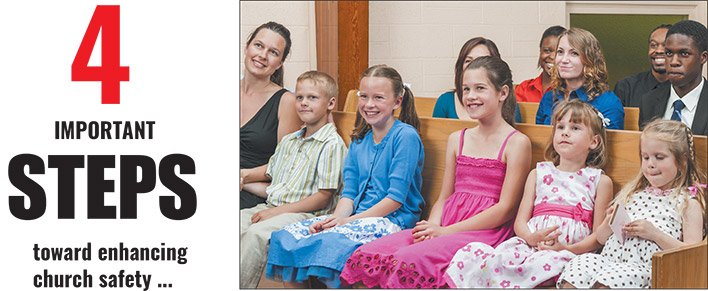Examining the most important elements that keep your church safe
By David Dawson
Baptist and Reflector
[email protected]
FRANKLIN — When addressing church leaders on the keys to making their facilities safe and secure, Tennessee Baptist Mission Board risk management specialist Mark LeMay often uses an old TV advertisement as a reference point.
“You remember the Fram oil filters commercials where the mechanic says ‘you can pay me now or you can pay me later,’ ” said LeMay during a recent safety seminar. “Well, that applies to church safety. It’s amazing how spending some money up front can save you from spending thousands of dollars down the road.”
LeMay, who has been with the TBMB for 20 years, presented his safety seminar at last month’s Bivocational Ministers and Wives Retreat in Gatlinburg. During his presentation, LeMay said some preventive measures might initially seem “over-the-top” or “excessive” but will often end up being exactly what was needed to avoid an incident or even a tragedy.
LeMay refers to some potential safety concerns as “brown recluses” because the problems, like the spiders, aren’t always easy to spot, but can be very damaging.
“In our churches, we have issues among us — the brown recluses — that are there, even you might not be addressing it,” he said. “And if they bite you, they’ll cost you more than you ever wanted to spend, and they will leave a scar that you will never get over.”
LeMay noted that church leaders need to set the tone for the congregation in terms of putting an emphasis on the safety and well-being of those attending services and other gatherings on the church grounds.
“A wise leader gets people to act, and not react,” LeMay said. “A safety mindset doesn’t just happen. It takes someone who is passionate about creating a program that is focused on ministry. It takes planning and leadership. And it takes you! As a pastor, you don’t want your church to look like a sheep without a shepherd.”
Some of LeMay’s main points can be found below.
 Is my church incorporated?
Is my church incorporated?- Do we have someone responsible for church security?
- Do we have policies and procedures in writing that address church related activities and facilities?
- Do we require background checks on anyone working with minors?
- Do we have a MVR (Motor Vehicle Report) on anyone who drives for our church?
- Do we have maintenance records on church vehicles?
- Do we have proper insurance coverage?
Create a culture
“You have to create a culture at the church where, if someone is legally carrying a firearm, they never show it to anyone at the church,” said LeMay. “Doing this keeps the responsibility and liability on the gun owner who has been through the proper procedures.”
Have your church become a no-carry property
“Liability-wise, if you turn your church into a no-carry property — which includes posting signs and covering this in your church’s policies and procedures — the chances are good that will stand up in a court of law,” said LeMay. “You can say that your church has a policy against carrying guns on the church property, and therefore, this person was acting as an individual and was going against our policy.”
Be informed regarding liabilities
“The first step is for churches to check with their insurance agent to know what coverage they have,” said LeMay. “Having the right insurance — the one that best suits the needs of your church — is one of the most valuable ways to protect your church members. Most churches don’t know what coverage they do, and don’t, have.”
Engage the leadership
“This is NOT just pastors,” said LeMay. “You’ve got to find the people in your congregation that fit the mold and will help you out in this area. You have these people in your church, it’s just a matter of tapping that resource.” LaMay referenced Proverbs 11:14, which says, “For lack of guidance a nation falls, but victory is won through many advisers.” (NIV)
Form a team
“It is very important for churches to form a team or committee,” said LeMay. “Someone in your church family needs to have the responsibility of keeping your church safe. And they need to be a sanctioned committee so that they can bring their ideas and plans before the church.”
LeMay suggested that the church sanction this team with a church vote. Doing so, he said, will allow the team to make proposals and introduce policies that lead to positive changes. “No one likes to be on a team where they do a lot of work and then can’t do anything with it,” he said.
LeMay noted it is important to pick candidates who are in good standing with the church, show good judgment,and have integrity and compassion.
Assess your needs
LeMay suggested that church leaders take a close look at the unique needs of their ministry. He said one way of doing this is by getting together around the table and playing a game of “what-if.”
“This will give you a chance to talk about medical issues that might arise,” he said.
LeMay said these group discussions should include the question, “what would we do if someone had a medical emergency during church?” LeMay said. He said that will lead to a series of follow-up questions, such as, “What would the minister of music do? What would you (the pastor) say? What do the ushers do?”
LeMay said the round-table discussions should also include other questions, such as, “What if we had an active shooter on campus? How would we handle that?”
Make key decisions
 During the round-table discussion and assessment process, the church leaders identify safety and security problems and solutions. The next step is for leadership to make some decisions.
During the round-table discussion and assessment process, the church leaders identify safety and security problems and solutions. The next step is for leadership to make some decisions.
“This involves discussion about the scope, financing and timing of your programs,” LeMay said. “Be sure to consult with your church’s attorney and insurance agent about liability risks and insurance coverages.”
Lemay noted that this is when budget decisions must be made.
“It costs money (to be safe)” LeMay said. “That’s just a fact.” However, LeMay was quick to say that the money is well worth it. “It’s amazing how spending some money up front can save you from spending thousands of dollars down the road.”
“One of the most critical guidelines that churches can adhere to is this: Never place a church member in a situation where they could be accused. Following this policy can cover your church in so many areas.”
— Mark LeMay




